
Critical Caribbean Thought on Colonial Legacies
The Caribbean as we know it today is fundamentally a product of colonial activity and globalisation. Practically everyone that inhabits the Caribbean has ancestors from different continents due to colonial activity, which profoundly affects the area to this day. Caribbean writers, both in the Caribbean and all over the world, have produced much postcolonial and anti-colonial work, particularly from the 20th century onwards. The area is often seen as fragmented due to differing colonial histories and variety of languages. In this reading list, we present a selection of the many perspectives Caribbean thinkers offer when writing on colonial legacies.
As a melting pot of globalization and a place of constant cultural exchange, there is much to learn from the Caribbean for those living in other parts of the world. This reading list provides a modest overview of some of the most important titles that critically examine the colonial legacy and how it has shaped our collective society and culture.
All works in the list below are part of the collections of Leiden University Libraries (UBL) and can be borrowed by following the link under the title of the work, or by searching the Catalogue by title, author or keyword.
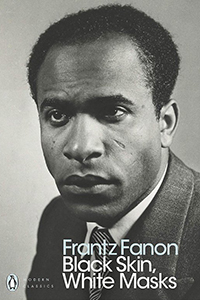
Frantz Fanon, Black Skins, White Mask
1967
Martinique-born psychiatrist and philosopher Frantz Fanon is considered one of the most important anti-colonial thinkers of the twentieth century, whose influence on contemporary thinking about the colonial past and its spillover into the present is undeniable. His best-known work is undoubtedly Peau noire, masques blancs (1952). The book, in which Fanon discusses the racism he faced in the Parisian intellectual circles, initially met with much resistance, but is now considered a crucial work of anti-colonial thought. In Black Skin, White Masks, as the English title reads, Fanon describes the psychological impact of living in the Western world as a person of color. As a result of being consistently seen as inferior, persons of color started behaving "white," people with black skin start wearing "white masks”. Fanon mixes personal experiences with literary and philosophical references in Black skin, white masks, making it a more than worthwhile read.
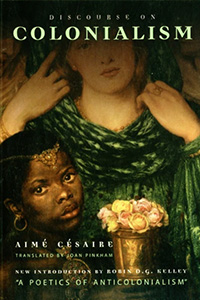
Aimé Césaire, Discours sur le colonialisme
1950
Also born on Martinique, Aimé Césaire (1913-2008) was an important poet, writer and politician. Together with Léopold Sédar Senghor (who would later become Senegal's first president) and Léon Damas (from French Guiana), he founded Négritude, a literary and political anti-racist and Marxist movement of black intellectuals from the African diaspora, in the 1930s. In 1950, Césaire published his influential Discours sur le colonialisme, published by the communist publishing house Éditions Réclame. In 1955, the essay was republished, then with the anti-colonial publisher Présence Africaine. The latter is the version of the essay as we know it today. In the essay, Césaire observes that European powers colonized territories with the pretense of bringing "civilization" to "savages," but ended up falling into barbarism themselves by killing, raping, and destroying the land in the colonized territories. Instead of bringing civilization, the colonizers actually destroyed civilizations, Césaire argues. Discours sur le colonialisme is considered a fundamental text upon which numerous anti-colonial thinkers and writers, such as Patrick Chamoiseau, Jean Bernabé and Raphaël Confiant, have built.
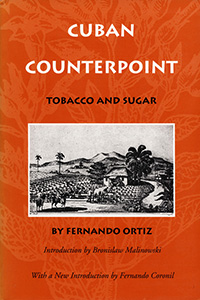
Fernando Ortiz, Cuban Counterpoint, Tobacco and Sugar
1940
Although an older title, Contrapunteo cubano del tabaco y el azúcar should be on any list discussing Caribbean intellectual history. Not just due to its unique structure, but also because of its conceptualization of ‘transculturation’, which the structure plays a major part in. As one would expect the book discusses the production and trade of tobacco and sugar in the Cuban context, but Fernando Ortiz approaches this subject matter in an unexpected way. The book consists of two parts, in which tobacco and sugar are the main characters: one part is an allegorical tale of these two products and the other is a historical analysis of tobacco and sugar.
By narrating these two parts in a kind of parallel, Ortiz develops his concept of transculturation, offering a productive way of thinking about the complex transformations that cultures went through as a consequence of inhabiting the same space within the context of colonial and imperial histories. A unique reading experience and a the highly valuable insights into how to study the Caribbean, this book is required reading for anyone interested in Caribbean history and culture.
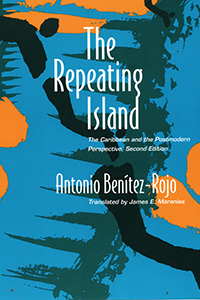
Antonio Benitez Rojo, The Repeating Island
1989
In the book that was originally titled La isla que se repite, Antonio Benítez-Rojo confronts the legacies of colonialism in the Caribbean space. He argues that the Caribbean, already a complex and extremely heterogenous place, should be approached in a different way than had thus far been done. The Caribbean is often perceived as fragmented, as an archipelago of puzzle pieces to different puzzles due to the linguistic, cultural and social legacies of colonialism. As a consequence academics and intellectuals have studied them in a similarly fragmented way, within their own spheres.
Benítez-Rojo takes a completely different approach: chaos theory. This approach allows him to do away with the common dichotomy of order versus disorder, but rather insist that these are two sides of the same coin. Besides this, the repeating island is a unique work because of the breadth of analysis and discussion offered on the Caribbean by writing on history, economics, sociology, cultural anthropology, psychoanalysis, literary theory, and nonlinear mathematics. To this day the text remains fascinating and offers an alternative way of thinking and writing about the Caribbean.
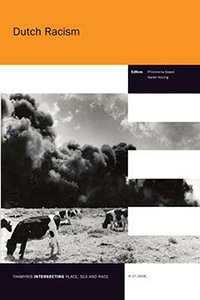
Philomena Essed & Isabel Hoving, Dutch Racism
2014
In 1984, Philomena Essed published her groundbreaking Everyday Racism, which highlighted and analyzed explicit, implicit and subtle racist actions in everyday life. In 2014, Essed co-edited Dutch Racism, together with Isabel Hoving, collecting about twenty contributions on the relationship between the Netherlands’ colonial past and everyday racism.
The contributions discuss a broad variation of topics, ranging from the Dutch role in the transatlantic slave trade to discussions about Zwarte Piet/Black Pete, to everyday racism in the workplace. The writers balance academic style with personal/political convictions, which has led to criticism. Criticism was also evoked by the frequent choice for qualitative research methodologies over quantitative ones. What connects the chapters is the thesis that Dutch racism takes on a specific form: because the Dutch self-image is rooted in a resolute dismissal of racism, it is often difficult to recognize and deal with racism in Dutch society.

Gloria Wekker, White Innocence: Paradoxes of Colonialism and Race
2016
How do we explain that many Dutch people see themselves as not racist, while racist statements and acts – sometimes subtle and implicit, but also outspoken and aggressive – are clearly present in Dutch society? This question takes centre stage in Gloria Wekker’s investigation of the Dutch self-image with regard to race and racism. The book received a great deal of attention when it was published in 2016. And while academics were generally favourable, Dutch politicians and journalists were often critical and felt attacked.
Wekker investigates the Dutch self-image with regard to race and racism through a broad range of sources, ranging from political debates, novels and films, to personal experiences. In five chapters, she successively analyzes everyday racism, the place of race in politics and academia, how psychologists in the early 20th century dealt with race, the relation between race and homosexuality, and finally Zwarte Piet/Black Pete. In a final chapter added to the Dutch edition, Wekker responds to critiques of her book.
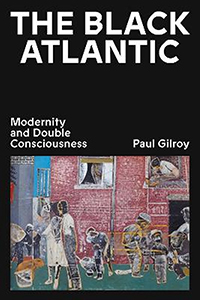
Paul Gilroy, The Black Atlantic
1993
The Black Atlantic: Modernity and Double Consciousness by Paul Gilroy is a seminal work that examines the intersection of black identity, modernity, and the concept of double consciousness with a particular focus on the African diaspora. Through meticulous research and engaging analysis, Gilroy presents a compelling argument for the interconnectedness of black cultures across geographical boundaries. Gilroy's examination of double consciousness provides a fresh perspective on the psychological experiences of black individuals living in predominantly white societies. He draws on the works of intellectuals such as W.E.B. Du Bois and Richard Wright to illustrate the complexities of navigating multiple identities and the internal conflicts that arise as a result.
Moreover, Gilroy’s framework explores how the Caribbean serves as a crucial site of resistance and cultural production. The region's history of uprisings, rebellions, and anti-colonial movements underscores the agency and resilience of its black inhabitants. Gilroy examines the ways in which Caribbean communities have utilized their cultural practices to assert their identity, challenge dominant narratives, and forge connections with other parts of the African diaspora. By incorporating the Caribbean into his analysis, Gilroy highlights the region's enduring contributions and emphasizes its central position in the global discourse on race, history, and modernity.
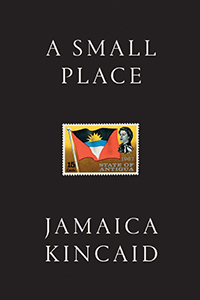
Jamaica Kincaid, A Small Place
1988
This powerful and poignant essay by Jamaica Kincaid explores the complex relationship between the Caribbean island of Antigua and its colonial history. Kincaid, who hails from Antigua, offers a scathing critique of the exploitative legacy of colonization and its lasting effects on the island and its people. In this thought-provoking work, Kincaid invites readers to see Antigua through her unfiltered lens, shedding light on the inequalities, corruption, and cultural erasure perpetuated by colonial powers. She challenges the romanticized image of the Caribbean as a paradise for tourists and exposes the harsh realities faced by its residents.
Kincaid confronts issues such as the impact of tourism, the erasure of indigenous culture, and the legacy of slavery. Her personal and passionate narrative serves as a powerful call to action, urging readers to critically examine their own roles and responsibilities in perpetuating or dismantling systems of oppression. "A Small Place" is a deeply introspective work that challenges readers to confront uncomfortable truths about colonialism and its ongoing impact. Kincaid's searing critique makes this book a must-read for anyone interested in postcolonial literature and the complexities of Caribbean history and identity.
Contact us
Is a relevant title missing on this list, or would you like Leiden University Libraries to purchase a book that is not yet present in our collections? Contact our subject librarians via Ask a Librarian.
